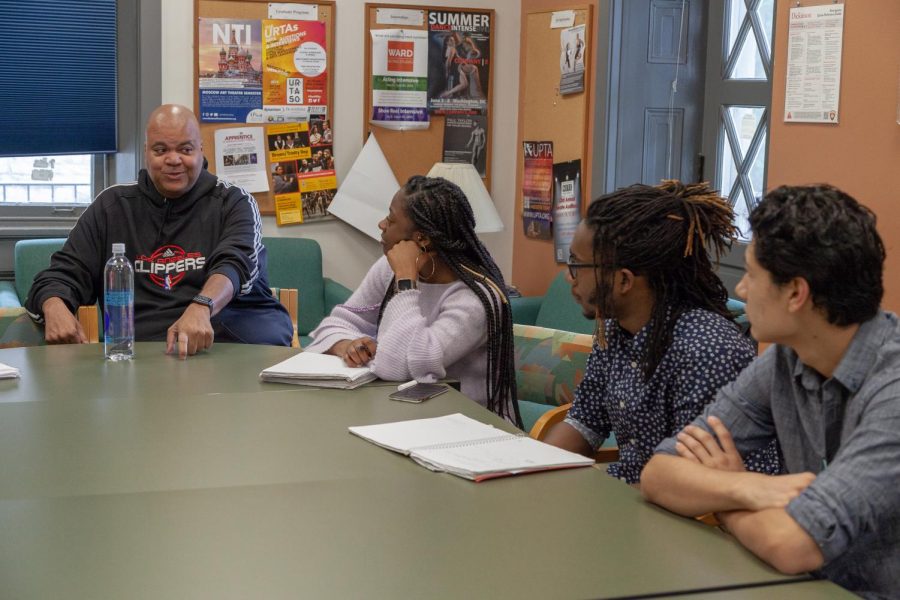‘My Role as a Writer is to Let My Characters be as Honest as I Can…’ An Interview with Edward Ricourt ’95, Poitras Gleim Speaker
The Dickinsonian sat down with Poitras Gleim speaker Edward Ricourt ’95. He spoke on Wednesday, April 17 at 7 p.m. in ATS. Ricourt is a screenwriter who collaborated on the film Now You See Me, served as consulting producer for the series Jessica Jones and was a writer for the show Raising Dion. The following interview is edited for clarity.
On writing…
I want to tell depictions of my culture and people I know and faces you don’t normally see.
You’re seeing a shift now in T.V. and in film where you’re seeing more diversity in everything from Black Panther to Crazy Rich Asians. And it’s not because Hollywood is feeling charitable.
On his characters…
My goal as a writer is to let my characters be as honest as I can and then audiences can go on a ride with them. I think if I make it too much about myself… I’m being prescriptive about what [the audience] should feel.
On his profession…
My role as a writer is to try to reflect the people I see as specifically as I can in T.V. and films to break down stigmas. You’re never going to see me write about a black crackhead mom or a dad who has a drinking problem and stuff like that. That wasn’t the family I grew up in, the stereotypical broken black family home…
I had a mom and a dad who raised me right. It was always, “I love you” every day, and “you can do anything you want” every day, and I had support. Just because you live in a poor
From page 1
neighborhood doesn’t mean you’re broken. It just means you don’t have a lot of money in your pocket. And I want to project those images as much as I can.
On Political Science…
My professor worked for the Raegan administration. He carried the constitution in his back pocket and would toss it at students and say, “every student should carry a constitution – what is this, what is that?” What’s fascinating about that was, I made him my advisor. I am as far from being a conservative and being a Reagan-follower as can be. But still we sat and we talked.
He always heard my point of view. Whether he disagreed, he never minimized my opinion or my thoughts and I respected that. I said, I trust him even though I don’t agree with him.
I had those [kinds of] discussions on campus, but it’s hard to do now. There’s so much anger and so much vitriol, you just feel it.
On Leda Fisher’s Feb. 7 opinion column…
She is someone who has written a piece that has gotten people’s attention. I think that’s part of the trick of storytelling. If you’re telling a personal story, if you’re telling anything, how do you get people’s attention? How do you elicit some kind of reaction and emotion? That’s my job as a writer – to elicit emotion. Make you angry, make you sad, make you fall in love, remind you of things. This was a thing she accomplished, for better or worse.
She should continue telling her story, clarifying her narrative. I was curious about the “what now?” for her. What does she plan to do with it?
I think it would be smart for Dickinson to not let the moment pass, but to continue to talk.
The conversation never ends, there’s no finish line to it, because in four years you’re going to have new faces and new opinions. I think the infrastructure at Dickinson has to continue to be an infrastructure of communication.
On diversity at Dickinson…
When I was here in ’95, no one looked like me… There was an incident where a student who was on my freshman floor wrote a Swastika on another student’s forehead. I think Dickinson today, there would have been outrage… But because there was no “other,” there was nobody to push back on that.
I was inspired that Dickinson has a climate now that Leda [Fisher] can send a letter like that. She can shout out, “I feel frustrated, I feel not heard, I feel enraged by this.”
What would be the alternative, should she be quiet? Should she, in essence, be like me, who did not write my thoughts and fears? She did something I never considered doing. I took my thoughts and fears and went to the basement of the HUB and that’s where I wrote my first screenplay, my story of being at this school and feeling a little isolated and not really knowing where I fit in.
On diversity in Carlisle…
Being a minority, being black on this campus, whether it’s 1995 or now, can be an uncomfortable experience. It’s not a Dickinson thing, they’re not fostering an uncomfortable experience, but it is a regional thing. It is where Dickinson is planted.
I went to Target yesterday, and just walking through Target, I saw two people with Confederate flag t-shirts. You feel that, and I think today, with our current president and our current economy – Pennsylvania is a manufacturing world – so there’s an anger in the working class of Pennsylvania that’s fostering a lot of [hate] groups.
The first time I ever heard the N-word was crossing High Street to the HUB from Morgan [while I was enrolled here]. Two girls didn’t want to stop and they yelled the word at me and went off laughing. And I was like, “wow, this is the town.” But as much as you can run into those people, I also knew Carlisle as a Fresh Air Fund kid, so I knew this area since I was ten years old and spent my summers here, and… have a love for the community. But in a world of honesty you have to say, this is a place where I know not every home would accept me in this region.
On Now You See Me…
I lived down in the Wall Street area of New York. During the Financial Crisis I would walk out my door and see all these people carrying boxes – they all lost their jobs and a lot of people lost their homes in foreclosure. But banks got bailouts and people still got rich. And I thought, I want to tell the story of the people who were affected. Is there a Robin Hood kind of superhero story?
[In the movie] they’re giving it to the audience and the audience is filled with people who’ve been robbed.
On Raising Dion…
It’s a story about a superhero, an 8-year old superhero child. But mom is really the superhero. It’s filled with all kinds of things that are part of my life… Mom was my hero. So to me it’s a love letter, a little bit, to my mom and her strength, and other single moms who can see themselves in that character.
On Jessica Jones…
We just made a Marvel TV show. But what we really did was give a portrayal of a survivor of assault.
She wasn’t perfect; she was a real person. And she has power, she has strength, and women saw that and said, “yeah, I am powerful too, I am surviving, I am here.” To me that has been more powerful than a lot of things I’ve done because it’s changed the course of some people’s lives for the better. It made them face and recognize their own strength. To me that’s the power of storytelling.
I don’t know what I would do without telling stories because that is my window to say: this is what makes me uncomfortable, this is what makes me happy.





